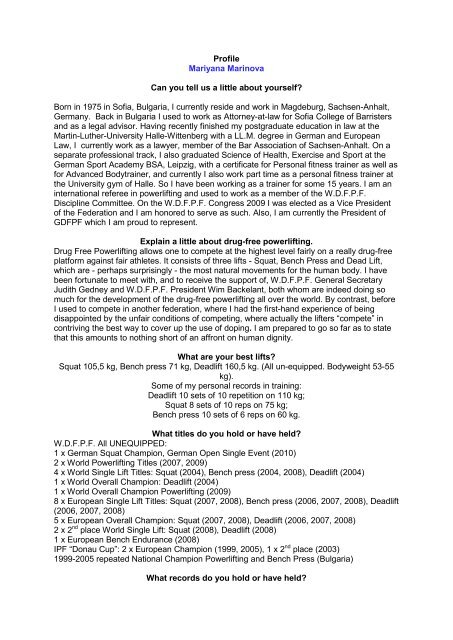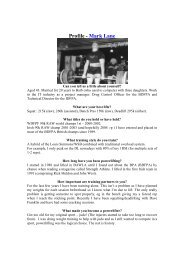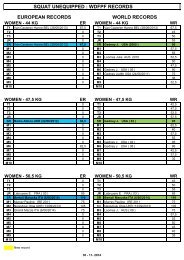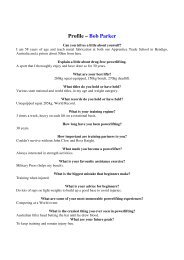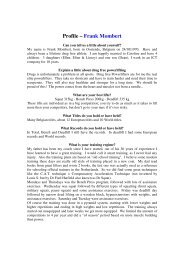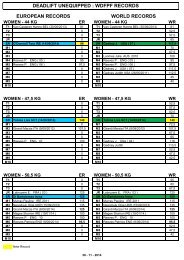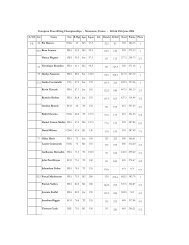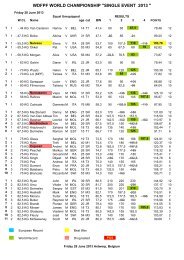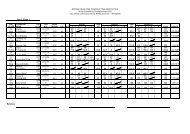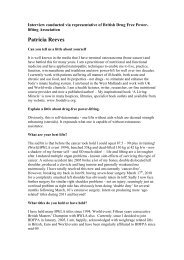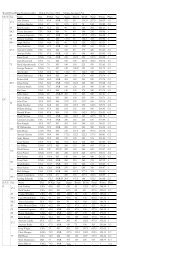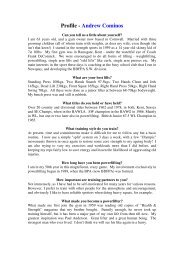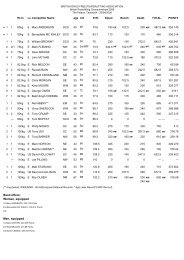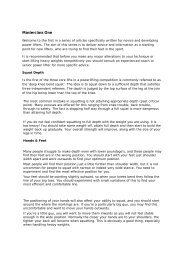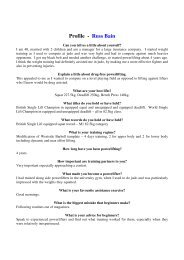Profile Mariyana Marinova Can you tell us a little about ... - bdfpa
Profile Mariyana Marinova Can you tell us a little about ... - bdfpa
Profile Mariyana Marinova Can you tell us a little about ... - bdfpa
You also want an ePaper? Increase the reach of your titles
YUMPU automatically turns print PDFs into web optimized ePapers that Google loves.
<strong>Profile</strong><br />
<strong>Mariyana</strong> <strong>Marinova</strong><br />
<strong>Can</strong> <strong>you</strong> <strong>tell</strong> <strong>us</strong> a <strong>little</strong> <strong>about</strong> <strong>you</strong>rself<br />
Born in 1975 in Sofia, Bulgaria, I currently reside and work in Magdeburg, Sachsen-Anhalt,<br />
Germany. Back in Bulgaria I <strong>us</strong>ed to work as Attorney-at-law for Sofia College of Barristers<br />
and as a legal advisor. Having recently finished my postgraduate education in law at the<br />
Martin-Luther-University Halle-Wittenberg with a LL.M. degree in German and European<br />
Law, I currently work as a lawyer, member of the Bar Association of Sachsen-Anhalt. On a<br />
separate professional track, I also graduated Science of Health, Exercise and Sport at the<br />
German Sport Academy BSA, Leipzig, with a certificate for Personal fitness trainer as well as<br />
for Advanced Bodytrainer, and currently I also work part time as a personal fitness trainer at<br />
the University gym of Halle. So I have been working as a trainer for some 15 years. I am an<br />
international referee in powerlifting and <strong>us</strong>ed to work as a member of the W.D.F.P.F.<br />
Discipline Committee. On the W.D.F.P.F. Congress 2009 I was elected as a Vice President<br />
of the Federation and I am honored to serve as such. Also, I am currently the President of<br />
GDFPF which I am proud to represent.<br />
Explain a <strong>little</strong> <strong>about</strong> drug-free powerlifting.<br />
Drug Free Powerlifting allows one to compete at the highest level fairly on a really drug-free<br />
platform against fair athletes. It consists of three lifts - Squat, Bench Press and Dead Lift,<br />
which are - perhaps surprisingly - the most natural movements for the human body. I have<br />
been fortunate to meet with, and to receive the support of, W.D.F.P.F. General Secretary<br />
Judith Gedney and W.D.F.P.F. President Wim Backelant, both whom are indeed doing so<br />
much for the development of the drug-free powerlifting all over the world. By contrast, before<br />
I <strong>us</strong>ed to compete in another federation, where I had the first-hand experience of being<br />
disappointed by the unfair conditions of competing, where actually the lifters “compete” in<br />
contriving the best way to cover up the <strong>us</strong>e of doping. I am prepared to go so far as to state<br />
that this amounts to nothing short of an affront on human dignity.<br />
What are <strong>you</strong>r best lifts<br />
Squat 105,5 kg, Bench press 71 kg, Deadlift 160,5 kg. (All un-equipped. Bodyweight 53-55<br />
kg).<br />
Some of my personal records in training:<br />
Deadlift 10 sets of 10 repetition on 110 kg;<br />
Squat 8 sets of 10 reps on 75 kg;<br />
Bench press 10 sets of 6 reps on 60 kg.<br />
What titles do <strong>you</strong> hold or have held<br />
W.D.F.P.F. All UNEQUIPPED:<br />
1 x German Squat Champion, German Open Single Event (2010)<br />
2 x World Powerlifting Titles (2007, 2009)<br />
4 x World Single Lift Titles: Squat (2004), Bench press (2004, 2008), Deadlift (2004)<br />
1 x World Overall Champion: Deadlift (2004)<br />
1 x World Overall Champion Powerlifting (2009)<br />
8 x European Single Lift Titles: Squat (2007, 2008), Bench press (2006, 2007, 2008), Deadlift<br />
(2006, 2007, 2008)<br />
5 x European Overall Champion: Squat (2007, 2008), Deadlift (2006, 2007, 2008)<br />
2 x 2 nd place World Single Lift: Squat (2008), Deadlift (2008)<br />
1 x European Bench Endurance (2008)<br />
IPF “Donau Cup”: 2 x European Champion (1999, 2005), 1 x 2 nd place (2003)<br />
1999-2005 repeated National Champion Powerlifting and Bench Press (Bulgaria)<br />
What records do <strong>you</strong> hold or have held
World records POWERLIFTING UNEQUIPPED (2009):<br />
Category 55, 5 kg, Open: Squat 105,5 kg, Deadlift 160,5 kg, Total 332,5 kg.<br />
World- and European records, SINGLE EVENT, UNEQUIPPED:<br />
Category 53 kg, Open: Squat 102,5 kg (2004), Deadlift 152,5 kg (2004);<br />
Category 55,5 kg, Open: Squat 102.5 kg (2008), Deadlift 147,5 kg (2008);<br />
Category 55,5 kg, Open: Squat 103,5 kg (2010)<br />
Bulgarian national record, UNEQUIPPED: Deadlift 160 kg (2005);<br />
What is <strong>you</strong>r training regime<br />
Most of the time, I train 5 or 6 days a week - in a four-day split routine: On day 1- Legs, on<br />
day 2 - Chest & Triceps and Biceps, on day 3 - Back and Shoulders, and every 4 day is my<br />
day off. On days 1 and 3, I do also cardio and abs. Sometimes, time permitting, I would do<br />
one-day split routine, (i.e. two different work-outs a day). Off-season, I train as a bodybuilder<br />
but always keeping all three Powerlifting disciplines in my routine.<br />
How long have <strong>you</strong> been powerlifting<br />
Well, let’s do the math: I started training bodybuilding in 1994 at the age of 19, and have,<br />
ever since then, been doing the three Powerlifting movements. My first competition in<br />
powerlifting took place in 1999.<br />
How important are training partners to <strong>you</strong><br />
I enjoy always, when I get the chance to share my efforts in training both to be mentally<br />
supported and physically spotted. In fact, I think that it is very important to have a good<br />
spotter, someone who could spot properly, especially for the bench press and the squat,<br />
which is not easy to find, as it may seem at first glance. I m<strong>us</strong>t point out, however, that most<br />
of the time I would train alone.<br />
What made <strong>you</strong> become a powerlifter<br />
It was in the first gym I ever joined where I encounter, and eventually befriended, those who<br />
first encouraged me to compete, which I did for the first time in 1999, on the Bulgarian<br />
national competition. I am still thankful for it to them. Then there was a “small predicament”:<br />
At that time, and in that competition, no other women competed in powerlifting in Bulgaria.<br />
My friends kept saying that I am stronger than many of the guys in my category, so I should<br />
enter competition, and compete against those guys. I did j<strong>us</strong>t that and won (in category 52<br />
kg.). My achievements in the deadlift balanced out the superiority of the guys in the bench<br />
press, so I won the first place in the total. Thereafter, I went on to compete in this way for five<br />
more years. I am especially proud that in 2004 I established the first competition in<br />
powerlifting for women in Bulgaria, which has been held ever since.<br />
What is <strong>you</strong>r favorite assistance exercise<br />
I would single out seated front shoulder press. I also enjoy leg press and rowing with T-bar.<br />
What is the biggest mistake that beginners make<br />
Perhaps that they would foc<strong>us</strong> on the weight. But trying to <strong>us</strong>e too much weight leads to bad<br />
technique and, through it, to injuries. The frequency of training and the consistency in training<br />
should by far be more important. The intensity should be the last to increase. Also, another<br />
big mistake is being impatient, for it takes a really long time, patience and dedication for one<br />
to develop and improve oneself.<br />
What is <strong>you</strong>r advice for beginners<br />
To learn more <strong>about</strong> the scientific basis of the training process and to read more, to search<br />
all kinds of information <strong>about</strong> new methods, without copying them automatically and without<br />
applying them absolutely. To set achievable targets, while not giving up the unattainable. To<br />
learn correct technique even if this would mean to reduce the weight is very important for
eginners. And to arrange cyclically their training in order to minimize plateauing and<br />
maximize progressing.<br />
What are some of <strong>you</strong>r most memorable powerlifting experiences<br />
I would mention two special ones. My first competition on W.D.F.P.F. at the World<br />
Championships 2004, Antwerp, Belgium. Also the 6 th March 2005 competition in Bulgaria<br />
when I deadlifted 160 kg for the first time.<br />
What is the craziest thing <strong>you</strong> ever seen in powerlifting<br />
It is not un<strong>us</strong>ual to hear competitors scream while making their attempts, right. But once I<br />
witnessed something that struck me as quite crazy, though not necessarily in a bad way: in a<br />
competition, a German duo - a trainer and his lifter - would always in every lift scream loudly<br />
and continuo<strong>us</strong>ly, as if in concert. Many found it strange and funny. Me too; as <strong>you</strong> can see, I<br />
still remember it.<br />
What are <strong>you</strong>r future goals<br />
Most of all, staying healthy and continuing to train and improve. Already many of my<br />
personal goals lie outside competitive powerlifting and have more to do with in<strong>tell</strong>ectual<br />
development, which includes, among other things, the science of sport and human body.<br />
What do <strong>you</strong> think is the most important factor when it comes to upping <strong>you</strong>r lifts<br />
This is very difficult to pin-point. Let me put it this way: there are, I think, a conventional and a<br />
deep aspect to lifting. I don’t think that the controlling motivation for one should be to lift more<br />
than anyone else, or certainly not only this - which is the conventional aspect - for this leads<br />
one away from the opportunity to encounter the world of weights as a kind and domain of<br />
experience in a profound sense, which obvio<strong>us</strong>ly would be the deep aspect. There is the<br />
danger in the conventional way for weightlifting to became j<strong>us</strong>t a means to the goal of<br />
showing up one’s own ego, so the deeper experience remains closed off. This is why I, for<br />
one, am motivated by the desire to get deeper into this world, which opens up only in an<br />
attunement of respect to this world. From this deep place, one can summon force and<br />
motivation for vario<strong>us</strong> derivative objectives, including better results. I hope this would make<br />
sense to <strong>you</strong>.<br />
Do <strong>you</strong> think powerlifting should become an Olympic sport<br />
Why not! I see no good reason for keeping it out of the Olympic movement. But, needless to<br />
say, this would require a very strict drug control policy, which I welcome wholeheartedly.<br />
How do <strong>you</strong> see the future of powerlifting<br />
I say very bright. To be sure, more publicity would not hurt. We could also wish ourselves to<br />
get more countries to join <strong>us</strong>. More education is important, too: Powerlifting gives the<br />
opportunity to live in an intimate involvement with the sport not only through the <strong>you</strong>ng years,<br />
nor even for the most part of the life, but through the whole life, which gives nourishment not<br />
only to the body, but also to the spirit, the possibility to have constant and firm fulcrum for life.<br />
Clearly, this goes beyond the limits of sport alone. Importantly, there are many examples in<br />
this regard, but I would like to mention a well-known name to the members of our Federation<br />
– Pat Reeves.<br />
What does <strong>you</strong>r diet consist of<br />
I like tuna with rice, despite the lingering environmental concern with the tuna, so well<br />
publicized. Also I eat and recommend all the <strong>us</strong>ual bodybuilding type foods, such as chicken,<br />
pasta, vegetables, potatoes.<br />
What makes the difference between an average lifter and a champion<br />
In order to answer this question, I would like to ask and answer another question: What does<br />
it mean to be a “champion” Well, it is easy: the one who receives the golden medal at the
end of competition, but I submit that there is more to it than j<strong>us</strong>t that. As already intimated<br />
earlier, I think that the underlying condition <strong>about</strong> it is the devoted and respectful attitude to<br />
the sport, viewing it as something greater than „me“, which already transcends the<br />
competition and begins to inform a way of life. The championship for me resides most of all<br />
in this dimension and is <strong>about</strong> a constant effort. In this sense, a powerlifter, average in<br />
competition, is not always so far away from the idea of the champion as it may seem. Now,<br />
let me quickly stipulate that this does not eliminate the competitive moment, the sense of<br />
competition, and the medal standard, but rather broadens it in a fundamental way. I fact, I<br />
can testify and also confess that a medal in a true, and fair competition always brings<br />
enormo<strong>us</strong> satisfaction. Yet, those foc<strong>us</strong>ed on the medal only, are prone to consider the<br />
medal as a mere symbol of their own victory and a personal merit, but this kind of champion<br />
isolates himself/herself in an ill<strong>us</strong>ive world of superiority over the sport. So, I see two kinds of<br />
attitudes here, and I recommend to the true devotees of the sport to seek the option of f<strong>us</strong>ion<br />
here.<br />
What training style do <strong>you</strong> think works best<br />
Everyone has to learn how to listen to one’s body. The individual training and the instinctive<br />
principle is the style that could work best. But to avoid misunderstanding, I should<br />
immediately point out that what I mean by “instinctive principle” is far from the arbitrariness of<br />
the individual, who does not pay attention to scientific achievements. Rather conversely -<br />
extending this knowledge so far as to make it individualized and c<strong>us</strong>tomized for<br />
himself/herself alone. So, this is more like putting into concrete practice the knowledge<br />
attained.<br />
Do <strong>you</strong> think bodybuilding exercises should be in a powerlifters’ routine<br />
Definitely, as far as I am concerned! I deem myself a believer in the Bodybuilding way of<br />
training. Through it, I have personally achieved good results with performing such exercises<br />
and methods of increasing strength, endurance and increased hypertrophy. But this works<br />
both ways, I would argue that powerlifting exercises are, in my view, the most important in<br />
bodybuilding.<br />
What are <strong>you</strong>r favorite supplements<br />
I take multi vitamins and protein powder. Sometimes also creatine.<br />
What has powerlifting taught <strong>you</strong><br />
Powerlifting has taught me how to concentrate on whatever I do. This goes a long way, for<br />
with hard work and dedication <strong>you</strong> can achieve all <strong>you</strong>r goals.<br />
What does powerlifting mean to <strong>you</strong><br />
It means the world to me. Powerlifting gave the chance to be healthy and strong as well as to<br />
make friends around the world. Now, what more can <strong>you</strong> ask for! In fact, health, strength<br />
and concentration, developed through powerlifting, have been helping me in all of my other<br />
initiatives. I hope I can pass these values on to others.<br />
My best regards to all powerlifters: Keep up the good work, and make it as “heavy” as<br />
possible !!!<br />
My special thanks to Sharron Clegg <strong>about</strong> the interview.


